Photographs: Courtesy, Bluegape.com Reuters
Instead of pursuing self-defeating austerity, Narendra Modi could pass on more cash to the states, says Andy Mukherjee.
Narendra Modi will have empty coffers greeting him. If pollsters' predictions come true and the opposition politician becomes India's prime minister next month, he will have to contend with a grim fiscal situation.
Total public expenditure is growing at a pace of 15 per cent annually, faster than the expansion in the nominal economy. Meanwhile, tax collections have increased only 10 per cent in the first 11 months of the fiscal year that ended in March.
Mr Modi might be tempted to hit the brakes on spending. But an austerity drive could be self-defeating in a weak economy.
…
Lessons for Modi to put the economy on track
Photographs: Reuters
A better option will be to take a leaf out of his party's manifesto and embrace fiscal federalism: by passing on more of New Delhi's spending to India's 30 state governments and asking his finance minister to concentrate on garnering higher revenue, Mr Modi will not only ease India's persistent budgetary problems but boost his stock as a national politician.
The benefits of such a strategy are compelling. Economists at the Reserve Bank of India have shown that an additional rupee spent by the central government produces four paise in extra output.
The same dollar spent at the state level generates 11 paise. In other words, the fiscal multiplier for states is three times bigger.
…
Lessons for Modi to put the economy on track
Photographs: Reuters
The difference arises from the different ways the national and sub-national administrations earn the cash they spend.
The Centre, which has fewer budget constraints, is more likely than the states to finance spending with borrowing. But higher borrowing by the Union government pushes up the cost of funds for companies and consumers, taking a toll on private demand.
That makes spending by New Delhi less effective.
And yet, the Centre insists on spending almost as much as the states. The current administration of Prime Minister Manmohan Singh is estimated to have spent 15 per cent of gross domestic product (GDP) last year, compared with a combined 16 per cent of GDP in state-level expenditure.
…
Lessons for Modi to put the economy on track
Photographs: Reuters
To see why that's the wrong approach, take the example of a flagship centrally sponsored programme: The Mahatma Gandhi National Rural Employment Guarantee Scheme, under which New Delhi pays villagers for 100 days of work in a year, mostly for digging up and filling holes.
The programme is rife with corruption and produces few durable assets.
If the central government instead genuinely passed on the Rs 33 lakh crore it currently makes available for the programme to the states, they might be able to use the funds more effectively.
The states might still provide a job guarantee, but generate more output - and assets - in the process. In the same way, the federal government could eliminate nationwide food, fertiliser and energy subsidies and pass on the resulting savings to the states to spend the money according to local needs.
…
Lessons for Modi to put the economy on track
Photographs: Reuters
If the federal government were to pass on the job of spending, say, five percentage points of GDP to the states - and also give them matching tax revenue - then aggregate expenditure would remain unchanged.
But because the spending is now being done by a more effective branch of the executive, the GDP growth rate would get a permanent boost thanks to the higher fiscal multiplier at the state level.
There need not be a political backlash against such a move: the more progressive state chief ministers will welcome the opportunity to play a bigger role in job creation and poverty reduction. If they perform well, the voters in the state will reward them.
…
Lessons for Modi to put the economy on track
Photographs: Reuters
Those who squander money or line their own pockets won't be able to blame the federal government for their poor performance.
The promise of a better fiscal bargain might even prompt state leaders to drop their opposition to a nationwide goods and services tax (GST). Introducing the long-pending levy would be a major victory for the Modi government.
The GST will subsume many bad taxes that introduce inefficiencies in production and movement of goods and services.
But what are the odds that something like this could actually happen? Mr Modi's Bharatiya Janata Party said in its election manifesto that its government's goal will be to make state chief ministers equal partners and "evolve a model of national development, which is driven by the states".
If that is vague, the manifesto also made an explicit promise to grant greater fiscal autonomy to sub-national governments.
…
Lessons for Modi to put the economy on track
Photographs: Reuters
Poll promises can't be taken at face value. But apart from the persuasive economics of the strategy, Mr Modi might also have a personal reason to prefer greater fiscal devolution.
If he wins, he will be the first Indian leader in 18 years to have previously been a chief minister of a state.
Indeed, the combined experience of all other prime ministers before him in running a state falls short of the 12 years that Modi has spent governing Gujarat in western India.
That shows just how hard it has been for even better-performing chief ministers to have grander aspirations.
…
Lessons for Modi to put the economy on track
Photographs: Reuters
One unintended consequence of greater fiscal devolution could be that there will be more chief ministers whose economic performance will make the front page of the national press.
They too could then hope to garner broad-based mass appeal. But for Mr Modi the risk of greater political competition is worth taking if by sharing more fiscal resources, he can expand his party's influence in the east and south of the country, where it has traditionally been weak.
India's fiscal fragility is chronic. It keeps returning with infuriating regularity. Since the government makes it almost mandatory for banks to finance its budget deficit, the bond market doesn't send a true signal of what New Delhi would pay if it had to compete with other borrowers for household savings.
…
Lessons for Modi to put the economy on track
Photographs: Reuters
Even so, the yield on 10-year government bonds is now nine per cent, or two percentage points higher than at the same time last year.
The outgoing government very likely missed its goal of restricting the budget deficit to 4.6 per cent of GDP, although the magnitude of the slippage will only be known next month.
Setting the fiscal house in order will be high on the next prime minister's agenda. If that person is Mr Modi, he might as well take a bold gamble and pass on more spending decisions to the states.
The writer is the Asia economics columnist at Reuters Breakingviews in Singapore. These views are his own.

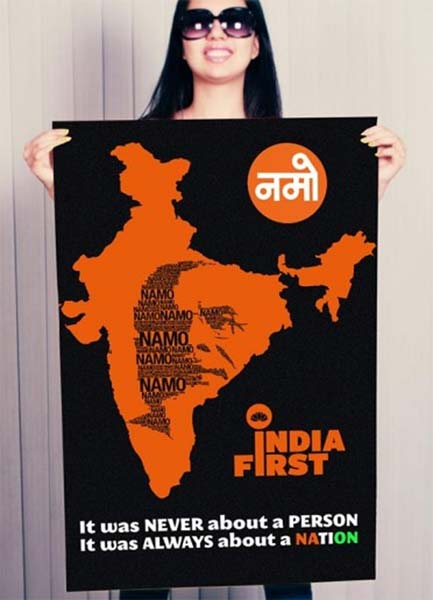
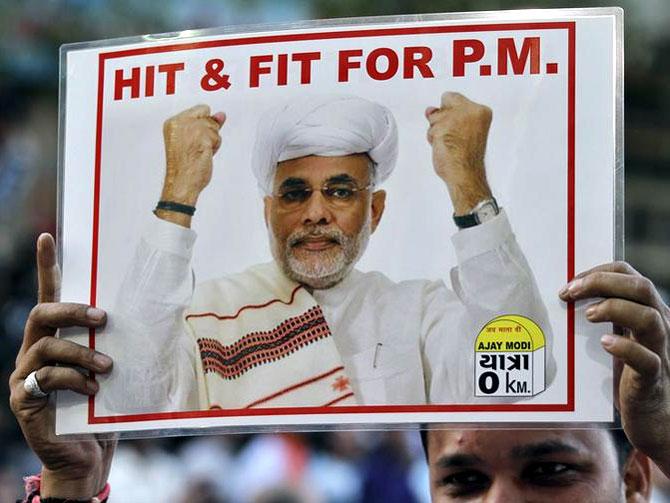




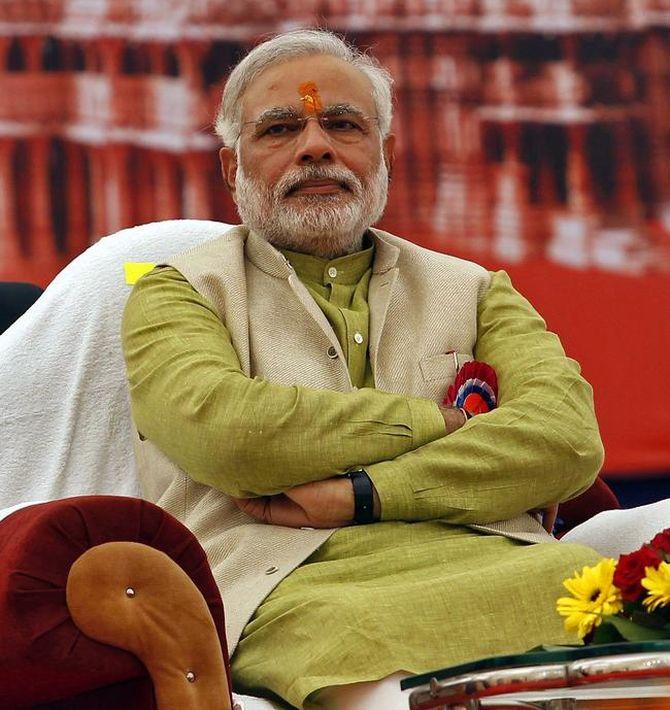
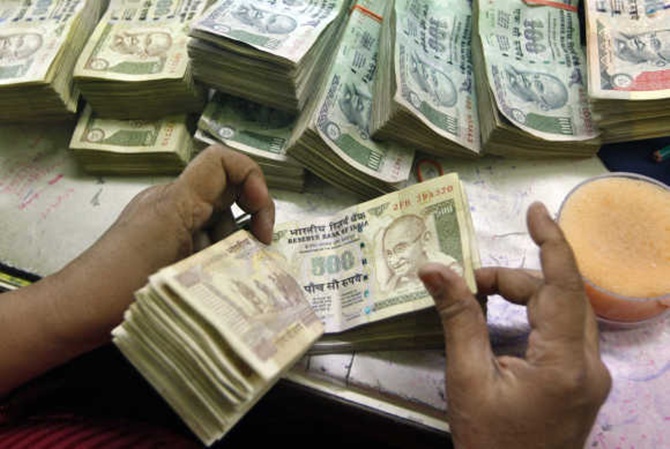
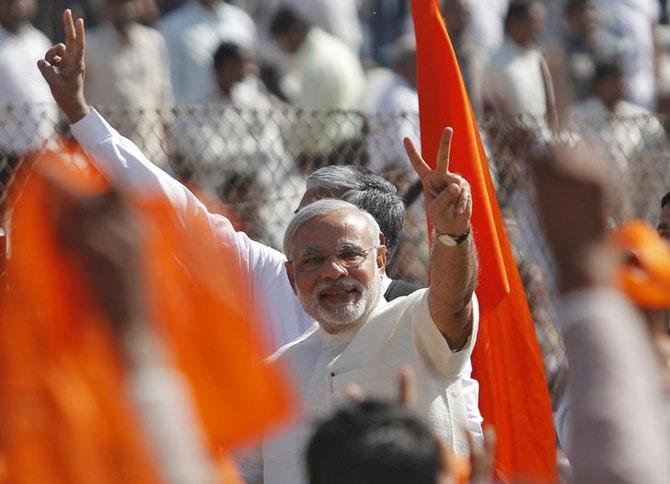

article